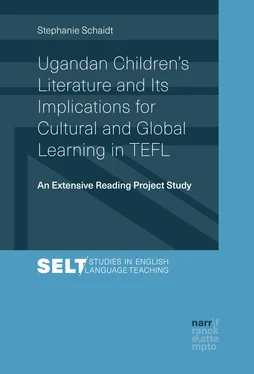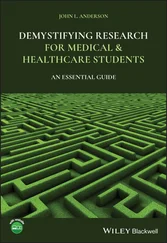Gwendolyn’s story, starting off so well, is eventually a story full of disasters; it does not even end in a positive way. Stories of this type want to shock; they pass a strong warning to the young readers and also often attribute the blame to the girls.
In other HIV/AIDS narratives, however, children are presented as the heroines and heroes who overcome stigma, fight discrimination and courageously talk about their own HIV status. Julie in the short story “JJ” (Segawa, 2010), for example, is HIV-positive from birth. Nevertheless, she lives a ‘normal’ life, with medication. She goes to school every day and has friends who know about her infection and support her. One day she decides to talk openly about her infection in a school assembly. The other students, who were not yet aware about it, are impressed by her strength and braveness and her friends are very proud of her. The message of this story is entirely positive and intends to encourage young people to stand up against stigma and discrimination.
There is actually still a lot of stigmatisation linked to HIV/AIDS worldwide. Frequently it serves as a means to turn infected people into ‘the other’. Those who are infected or who have an HIV-positive family member often face denial and segregation. Sometimes HIV-positive people are feared by others; many people do not know how to deal with a person who is infected. The topic of stigma is also focalised in some of the Ugandan narratives. In, I Will Miss Mr Kizito (Sempebwa, 2005), for example, Mr Kizito is dismissed from his job as a teacher because he is HIV-positive. In the novella Voice of a Dream (Namukasa, 2006), Nanfuka and her siblings face exclusion from community because their father has AIDS. As Strauhs (2013, p. 173) states,“[t]he moment AIDS marked the body of her [Nanfuka’s] father […] not only stigmatized her father but in fact pushed her whole family, including Nanfuka – once the shining star of her village – to the periphery of the village community”. Nanfuka and her family become the secret “gossip charts” (Namukasa, 2006, p. 56) in the village.
HIV/AIDS is not only an issue that affects individuals but families and whole societies. This becomes apparent in the fact that the HIV/AIDS epidemic created many orphans in Uganda. It is amongst the countries with the highest numbers of children orphaned by AIDS.5 In a situation when the parents are dead, support is usually provided by the extended family in Uganda. It is the responsibility of the aunt, uncle or grandparents to care for the orphaned children. AIDS is, however, also a common factor behind child-headed households in the country (Witter, 2002, p. 64). The topic of children raising their own siblings is dealt with in Voice of a Dream . Nanfuka’s life changes all of a sudden when her father dies from AIDS and her mother abandons the family, leaving her alone with her four younger siblings. Nanfuka cannot go back to school but she has to care for her brothers and sisters now. She is responsible for them and the family’s income. Her only remaining relative nearby, Aunt Naka, does not assist Nanfuka in anyway, but instead wants to marry her off as soon as possible. She intends to make money with the land her brother left his children. The novella, therefore, also reflects upon the ineffectiveness of some traditional support structures (i. e. extended family) in the context of HIV/AIDS.
4.4.2.4 Empowering the Girl Child
Since the foundation of the Ugandan Women’s Writers Association FEMRITE by Honorable Mary Karoro Okurut in 1995, women writing gained in importance in Uganda. The mission of the NGO is “to build a sustainable platform for Ugandan women to contribute to national development through creative writing” (FEMRITE, n.d.). It wants “to create an enabling atmosphere for women to write, tell and publish their stories” (Twongyeirwe, 2009, p. xiii). FEMRITE organises activities such as weekly book clubs, workshops and radio or television programmes. It works together with schools and teachers and tries to promote a reading culture in the country (Kruger, 2011, p. 6). The association also has a small resource centre and a publishing unit. The support network of the organisation has shaped the careers of the writers. By now, many of the members of FEMRITE have gained national and even international reputation and have won prestigious literary awards (ibid., p. 3).
In Ugandan women’s writing, readers are exposed to new topics and experiences which were not common in Ugandan literature before. Female protagonists, who were formerly underrepresented in Ugandan writing, are increasingly used in the texts. In addition, female vulnerability and female silence enforced by society, but also female strength and revolt against conventions, are focalised. Moreover, established stereotypes and gender inequality in society are attacked and the women writers make a clear “power bid” (Kiyimba, 2008, p. 219).
In traditional Ugandan society, women were known as “carriers of ‘tradition’” (Kiguli, 2007, p. 171). They were usually considered responsible for the upbringing of children which included the telling of stories.1 Thus, it is not surprising that most writers of Ugandan children’s fiction are actually women; indeed, the very first writer who wrote for children in Uganda, Barbara Kimenye, was a woman.
Ugandan women writers write about various topics; frequently, however, their narratives focus on the girl child. They, for example, talk about girl child education, teenage pregnancy, young adult marriage, sexual abuse by adults and the issue of sugar daddies in their stories. Ugandan women writers can be considered to have a different approach to writing about women’s topics than their Western counterparts. They see things, as the Nigerian writer Buchi Emecheta expressed it, “through an African woman’s eyes” (2007, p. 553). Emecheta remarked at a conference:
if I am now a feminist, then I am an African feminist with a small f. In my books I write about families because I still believe in families. I write about women who try very hard to hold their family together until it becomes absolutely impossible. (Ibid.)
I want to illustrate this with an example. In a group interview with UCWIA, when confronted with the question whether they consider folktales like Njabala2 that portray Ugandan women in an unfavourable light as still relevant for children today, the women writers present answered in the affirmative. They stated that they consider folktales which teach girls how to behave like “African women” as very important. Rose Rwakasisi explained:
We want our girls to grow up as African women, educated or not. […] And for us now, we are worried. The boys today are not developing into African men and the girls not into African women any longer. And that’s why we try to bring them back to the African way.3
There are, however, also many Ugandan narratives whose major aim it is to empower the girl child. I Will Not Fail (Kisubi, 2008), for example, tells the story of Namukose who grows up in a society that does not approve of girls going to school. In a village meeting, comments such as “You don’t gain anything by educating a girl. The only people who gain are the family she will get married into.” (ibid., p.2) or “You want to educate girls? Don’t you know that a girl’s place is in the kitchen? Why waste time and money on a girl?” (ibid.) are made. The introduction of Universal Primary Education in Uganda still gives Namukose the chance to go to school and she is a very successful student. Constantly encouraged by various strong women, i.e. her mother, her class teacher and Dr. Robinah Kalembe, a head of faculty at Makerere University, Namukose manages to complete primary school as the best student at her school and wins a scholarship that takes her through secondary school and university education.
Читать дальше












